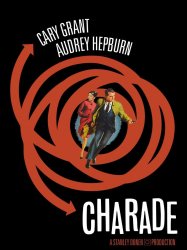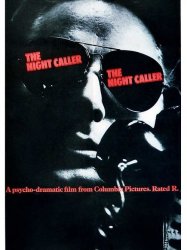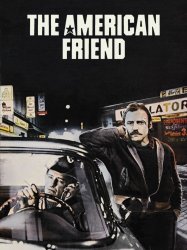Films with theme "Transport en Île-de-France", sorted by revenue

Charade (1963)
, 1h53Directed by Marc Maurette, Stanley Donen
Origin USA
Genres Drama, Thriller, Comedy, Comedy thriller, Romantic comedy, Crime, Romance
Themes Spy films, Transport films, Transport en Île-de-France, Métro parisien dans la culture populaire
Actors Cary Grant, Audrey Hepburn, Walter Matthau, James Coburn, George Kennedy, Dominique Minot
Regina "Reggie" Lampert (Audrey Hepburn), on a skiing holiday in Megève, tells her friend Sylvie Gaudel (Dominique Minot) that she has decided to divorce her husband Charles. She then meets a charming stranger, Peter Joshua (Cary Grant). When she returns to Paris, her apartment is completely empty, and police inspector Edouard Grandpierre (Jacques Marin) notifies her that Charles has been murdered while leaving Paris. Reggie is given her husband's travel bag, containing a letter addressed to her, a ticket to Venezuela, passports in multiple names, and other items. At the funeral, three odd characters show up to view the body. One sticks the corpse with a pin and another places a mirror in front of the body's mouth and nose, both to verify that Charles is really dead.

Le Brio (2017)
, 1h37Directed by Yvan Attal
Origin France
Genres Drama, Comedy, Comedy-drama
Themes Transport en Île-de-France, Métro parisien dans la culture populaire
Actors Daniel Auteuil, Camélia Jordana, Nozha Khouadra, Nicolas Vaude, Jean-Baptiste Lafarge, Claude Perron
Neïla Salah, originaire de Créteil, a toujours voulu devenir avocate. Dès ses premiers jours à l'université Panthéon-Assas, elle est confrontée au professeur Pierre Mazard, connu pour ses provocations et ses méthodes particulières. Il a un accrochage avec une étudiante arrivée en retard, qui fait une entrée assez bruyante . Il demande à cette étudiante perturbatrice de lui donner son nom, puis de définir Prénom et Nom, puisqu'il n'est pas sensé , comme de juste de connaître tous les prénoms étrangers. Il fait aussi remarquer que le droit français a évolué depuis Napoléon I, contrairement à la Charia, ce qui est vrai. Il donne pour exemple le choix des prénoms, il plaisante : " avant il fallait choisir le prénom dans le calendrier, à présent on peut appeler son enfant Carte Orange". Du coup, assez bizarrement, il est accusé de racisme. Pour se racheter et un peu manipulé par le directeur de l'université qui « ne peut plus le couvrir », Pierre est contraint de préparer Neïla à un prestigieux concours d’éloquence. Malgré son cynisme et son exigence, Neïla semble trouver en Pierre le mentor dont elle avait besoin. Tous deux vont cependant devoir tout d'abord passer au-dessus de leurs préjugés respectifs.

Les aristos (2006)
, 1h25Directed by Charlotte de Turckheim
Origin France
Genres Comedy
Themes Transport en Île-de-France, Métro parisien dans la culture populaire
Actors Charlotte de Turckheim, Jacques Weber, Vincent Desagnat, Julia Piaton, Victoria Abril, Rossy de Palma
The Arbac Family Neuville is a family of penniless aristocrats, that to survive and continue living their castle into disrepair, need to conduct some tricks like selling fake antiques to tourists. One day arises a bailiff commissioned by the Treasury for the recovery of a sum of nearly two million euro in respect of tax. In the event of default, all the family property will be seized. Follows a race against time to find the money. Everything is tried: a visit to the distant cousins still rich, a job search at the employment center in the Pauline boards, letter carrier and family friend, nothing works. Finally, Charles-Antoine, the eldest, who will have to go to a rally to go fishing to young unmarried aristocrat, namely Marie-Astrid Saumur-Chantilly Fortemure, wealthy heiress but particularly repulsive and stupid. Marriage is about to be organized, but Anthony Charles becomes infatuated with Pauline, opposing the interests of the family, the reasons of which reason knows nothing heart .

The Girl on the Train (2009)
, 1h45Directed by André Téchiné
Origin France
Genres Drama, Thriller, Romance
Themes Théâtre, Transport films, Rail transport films, Transport en Île-de-France, Films based on plays
Actors Émilie Dequenne, Catherine Deneuve, Michel Blanc, Mathieu Demy, Ronit Elkabetz, Nicolas Duvauchelle
Jeanne Fabre, an attractive late-teen-aged carefree loner, spends her time rollerblading through Paris and job-hunting, a nuisance she endures to indulge her widowed mother, Louise, who runs a day-care center out of their house. As they are watching a news program on television about anti-semitic attacks, Louise recognizes a person on the TV: Samuel Bleistein, a prestigious Jewish lawyer, who was many years ago in love with her. Louise arranges a job interview for her daughter at Bleistein’s law firm.

Subway (1985)
, 1h44Directed by Luc Besson
Origin France
Genres Thriller, Comedy-drama, Action, Crime
Themes Transport films, Rail transport films, Transport en Île-de-France, Métro parisien dans la culture populaire
Actors Isabelle Adjani, Christophe Lambert, Michel Galabru, Jean-Hugues Anglade, Richard Bohringer, Jean-Pierre Bacri
Having stolen some compromising documents from a powerful and successful entrepreneur/gangster at a party, a man known as Fred (Lambert) escapes from the police and takes refuge in the underground world of the Paris Métro stations and tunnels. There he joins the dwellers and befriends several colourful characters, including others who are living under the subway to avoid police arrest. While the gangster's henchmen try to find Fred, he develops a romance with the gangster's young trophy wife Héléna (Adjani). She had originally invited Fred to the party featured at the opening of the film, and is bored with her gilded-caged life.

Le Samouraï (1967)
, 1h45Directed by Jean-Pierre Melville
Origin France
Genres Drama, Thriller, Action, Noir, Crime
Themes Transport films, Transport en Île-de-France, Gangster films
Actors Alain Delon, François Périer, Nathalie Delon, Michel Boisrond, Cathy Rosier, Catherine Jourdan
Hitman Jef Costello (Delon) lives in a single-room Parisian apartment whose spartan furnishings include a little bird in a cage. A long opening shot shows him lying on his bed, smoking, when the following text appears on-screen:

Gates of the Night (1946)
, 2hDirected by Marcel Carné
Origin France
Genres Drama, Fantasy, Romance
Themes Transport films, Transport en Île-de-France
Actors Yves Montand, Serge Reggiani, Pierre Brasseur, Saturnin Fabre, Jean Vilar, Sylvia Bataille
In the winter of 1945, immediately after the liberation, Jean Diego (Montand), a member of the French underground during World War II, meets Raymond, one of his comrades in arms who was believed to have succumbed in battle. On the night of that meeting, Jean encounters a homeless man named "Destiny", whose predictions about him finding the woman of his life will not be too far from reality. Jean soon starts a liaison with Malou (Nathalie Nattier), a young woman who is married to a rich man. The next hours of his and Malou's lives are underscored by extreme, dramatic events; however, as the clochard (homeless person) predicted, they find their way out of the struggle and are able to move on, leaving behind wartime and its dangers.

La Jetée (1962)
, 28minutesDirected by Chris Marker
Origin France
Genres Science fiction, Fantastic, Romance
Themes Post-apocalyptic films, Films about religion, Transport films, Time travel films, Transport en Île-de-France, Films set in the future, Political films, Dystopian films, Alternate history films, Arme nucléaire, Disaster films, Photographie
Actors Jean Négroni, Hélène Châtelain, William Klein, André Heinrich, Ligia Branice
A man (Davos Hanich) is a prisoner in the aftermath of World War III in post-apocalyptic Paris where survivors live underground in the Palais de Chaillot galleries. Scientists research time travel, hoping to send test subjects to different time periods "to call past and future to the rescue of the present". They have difficulty finding subjects who can mentally withstand the shock of time travel. The scientists eventually settle upon the prisoner; his key to the past is a vague but obsessive memory from his pre-war childhood of a woman (Hélène Chatelain) he had seen on the observation platform ("the jetty") at Orly Airport shortly before witnessing a startling incident there. He had not understood exactly what happened but knew he had seen a man die.

The Big Swag (1965)
, 1h45Directed by Alex Joffé
Origin France
Genres Thriller, Comedy, Comedy thriller
Themes Transport films, Rail transport films, Transport en Île-de-France, Heist films, Gangster films, Escroquerie, Métro parisien dans la culture populaire
Actors André Bourvil, Paul Meurisse, Roger Carel, Bernard Fresson, Daniel Ceccaldi, Pierre Richard
Louis Bourdin, un humble poinçonneur de métro à la RATP, vantard mais peureux, travaille à la station Quai de la Rapée. Il est tellement fanatique de romans policiers qu'il en écrit un lui-même. Il prend le pseudonyme de Lenormand, et intitule son roman « Rapt à la RATP » : l'histoire imaginaire du hold-up de la rame des finances, qui collecte quotidiennement la recette des stations à la fin de service, vol qu'il décrit avec un luxe de détails. Il le propose à plusieurs éditeurs. Ceux-ci le dédaignant, il en fera bénéficier, bien imprudemment, une tout autre profession ... reconnaissante, mais dangereuse !

Masculin Féminin (1966)
, 1h50Directed by Jean-Luc Godard
Origin France
Genres Drama, Comedy-drama, Romance
Themes Transport en Île-de-France, Métro parisien dans la culture populaire
Actors Jean-Pierre Léaud, Chantal Goya, Marlène Jobert, Brigitte Bardot, Françoise Hardy, Birger Malmsten
The film stars Jean-Pierre Léaud as Paul, a romantic young idealist and literary lion-wannabe who chases budding pop star, Madeleine (Chantal Goya, a real life Yé-yé girl). Despite markedly different musical tastes and political leanings, the two soon become romantically involved and begin a ménage à quatre with Madeleine's two roommates, Catherine (Catherine-Isabelle Duport) and Elisabeth (Marlène Jobert). The camera probes the young actors in a series of vérité-style interviews about love, love-making, and politics.

The Down-in-the-Hole Gang (1974)
, 1h30Directed by Pierre Tchernia
Origin France
Genres Comedy
Themes Films about magic and magicians, Transport films, Transport en Île-de-France
Actors Michel Serrault, Philippe Noiret, Michel Galabru, Chantal Goya, Charles Denner, Jean Carmet
Jean-Paul Rondin (Michel Serrault) est libraire à Paris, près du Panthéon. Il est mécontent car sa boutique est située près d'un chantier de rénovation de la ville ordonné par le ministre des Travaux publics (Charles Denner).

Fear Over the City (1975)
, 2hDirected by Henri Verneuil
Origin France
Genres Drama, Thriller, Action, Crime
Themes Transport films, Transport en Île-de-France, Serial killer films, Gangster films, Métro parisien dans la culture populaire
Actors Jean-Paul Belmondo, Charles Denner, Lea Massari, Adalberto Maria Merli, Giovanni Cianfriglia, Jean Martin
Policeman Jean Letellier is under pressure because the infamous gangster Marcucci escaped him publicly. Moreover during the pursuit an innocent bystander was killed by a stray bullet. Letellier is investigated for having fired the deadly bullet.

The Three Kings (2001)
, 1h42Directed by Didier Bourdon, Bernard Campan
Origin France
Genres Fantastic, Comedy, Fantasy, Adventure
Themes Christmas films, Films about religion, Time travel films, Transport en Île-de-France, Métro parisien dans la culture populaire
Actors Didier Bourdon, Bernard Campan, Pascal Légitimus, Virginie de Clausade, Nathalie Roussel, Walid Afkir
The Biblical Magi find themselves in Paris in modern times, and become a media sensation.

The American Friend (1977)
, 2h7Directed by Emmanuel Clot, Wim Wenders
Origin German
Genres Drama, Thriller, Crime
Themes Medical-themed films, Peinture, Transport films, Transport en Île-de-France, Films about psychiatry
Actors Dennis Hopper, Bruno Ganz, Lisa Kreuzer, Samuel Fuller, Nicholas Ray, Daniel Schmid
Tom Ripley (Dennis Hopper) is a wealthy American living in Hamburg, Germany. He is involved in an artwork forgery scheme, in which he appears at auctions to bid on forged paintings produced by an accomplice, artificially driving up the price. At one of these auctions, he is introduced to Jonathan Zimmermann (Bruno Ganz), a picture framer who is dying of a rare and unspecified blood disease. Zimmerman refuses to shake Ripley's hand when introduced, coldly saying, "I've heard of you" before walking away.

The Professional (1981)
, 1h48Directed by Georges Lautner
Origin France
Genres Drama, Thriller, Action, Adventure, Spy, Crime
Themes Films set in Africa, French war films, Spy films, Monde imaginaire, Politique, Transport en Île-de-France, Political films, Métro parisien dans la culture populaire
Actors Jean-Paul Belmondo, Jean Desailly, Robert Hossein, Élisabeth Margoni, Cyrielle Clair, Bernard-Pierre Donnadieu
French secret agent Josselin Beaumont is sent to kill Colonel Njala, the dictator of Malagawi, a fictional African country. However, before he manages to accomplish his mission, the political situation changes drastically and the French secret service resorts to handing over Beaumont to the Malagawian authorities. After a long, unfair trial, during which Beaumont is injected with drugs, he is sentenced to long-term penal servitude at a "re-education camp".
 Connection
Connection